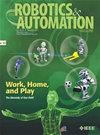Autonomous Ground Navigation in Highly Constrained Spaces: Lessons Learned From the Third BARN Challenge at ICRA 2024 [Competitions]
IF 5.4
3区 计算机科学
Q1 AUTOMATION & CONTROL SYSTEMS
引用次数: 0
Abstract
The third Benchmark Autonomous Robot Navigation (BARN) Challenge took place at the 2024 IEEE International Conference on Robotics and Automation (ICRA 2024) in Yokohama, Japan and continued to evaluate the performance of state-of-the-art autonomous ground navigation systems in highly constrained environments. Similar to the trend in the first and second BARN Challenges at ICRA 2022 and 2023 in Philadelphia (North America) and London (Europe), the third BARN Challenge in Yokohama (Asia) became more regional, i.e., mostly Asian teams participated. The size of the competition has slightly shrunk (six simulation teams, four of which were invited to the physical competition). The competition results, compared to the last two years, suggest that the field has adopted new machine learning approaches, while at the same time slightly converged to a few common practices. However, the regional nature of the physical participants suggests a challenge to promote wider participation all over the world and provide more resources to travel to the venue. In this article, we discuss the challenge, the approaches used by the three winning teams, and lessons learned to direct future research and competitions.高度受限空间中的自主地面导航:从 2024 年 ICRA 第三届 BARN 挑战赛中汲取的经验教训 [竞赛]
第三届基准自主机器人导航(BARN)挑战赛于 2024 年在日本横滨举行的电气和电子工程师学会机器人与自动化国际会议(ICRA 2024)上举行,继续评估最先进的自主地面导航系统在高度受限环境中的性能。与 2022 年和 2023 年在费城(北美)和伦敦(欧洲)举行的第一届和第二届 BARN 挑战赛的趋势类似,在横滨(亚洲)举行的第三届 BARN 挑战赛更具区域性,即主要由亚洲团队参加。比赛规模略有缩小(六支模拟团队,其中四支受邀参加实体比赛)。与过去两年相比,比赛结果表明,该领域采用了新的机器学习方法,同时也略微趋同于一些常见的做法。然而,实体参赛者的地区性表明,要在全世界范围内促进更广泛的参与并提供更多前往赛场的资源是一项挑战。在本文中,我们将讨论此次挑战赛、三支获胜团队采用的方法,以及指导未来研究和竞赛的经验教训。
本文章由计算机程序翻译,如有差异,请以英文原文为准。
求助全文
约1分钟内获得全文
求助全文
来源期刊

IEEE Robotics & Automation Magazine
工程技术-机器人学
CiteScore
8.80
自引率
1.80%
发文量
100
审稿时长
>12 weeks
期刊介绍:
IEEE Robotics & Automation Magazine is a unique technology publication which is peer-reviewed, readable and substantive. The Magazine is a forum for articles which fall between the academic and theoretical orientation of scholarly journals and vendor sponsored trade publications. IEEE Transactions on Robotics and IEEE Transactions on Automation Science and Engineering publish advances in theory and experiment that underpin the science of robotics and automation. The Magazine complements these publications and seeks to present new scientific results to the practicing engineer through a focus on working systems and emphasizing creative solutions to real-world problems and highlighting implementation details. The Magazine publishes regular technical articles that undergo a peer review process overseen by the Magazine''s associate editors; special issues on important and emerging topics in which all articles are fully reviewed but managed by guest editors; tutorial articles written by leading experts in their field; and regular columns on topics including education, industry news, IEEE RAS news, technical and regional activity and a calendar of events.
 求助内容:
求助内容: 应助结果提醒方式:
应助结果提醒方式:


